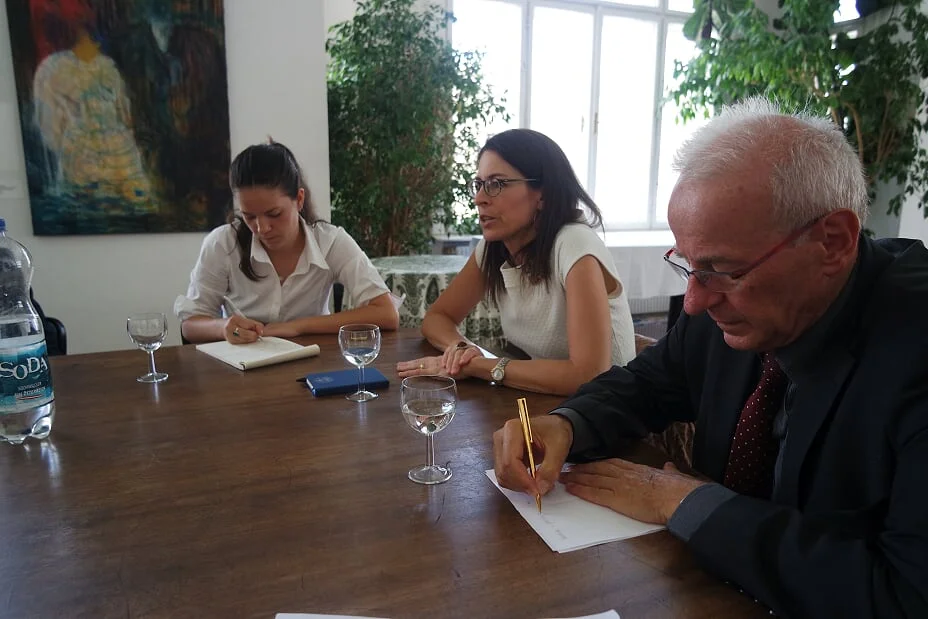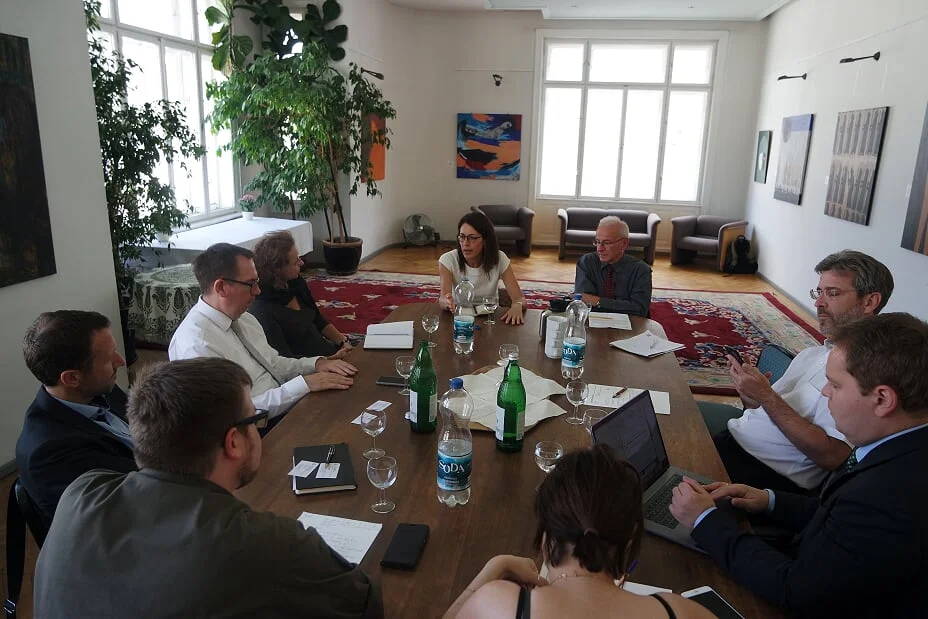by Lea Boraucke
The round table, which took place on 19 June 2018 at the IIP, gathered experts on international relations between Russia and Austria to a talk with Sharon Hudson-Dean, Acting Deputy Assistant Secretary in the Bureau of European and Eurasian Affairs. In a political present of a widening gap between Russia and the EU, this relation is becoming more important. With regard to the poisonous attack of the ex-spy Sergej Skripal in London, the participants discussed in particular the disinformation threat from Russia, which leads to an undermining of the objectivity of the media. The Russian propaganda and false media narratives mean also a threat to U.S. foreign policy. Although it should be noted, that fake news have also influenced the Western media landscape. It can be emphasized, that the worse Russia behaves, the opponents get more united. Nevertheless, Austria was one of the countries, which didn’t expel diplomats after the Salisbury attack, but which wanted to keep up relations with Russia. This also lies in the nature of Austria’s neutrality. Austria and the U.S. differ in terms of political topics on North-Korea and the Nuclear Agreement with Iran.
Regarding the U.S.-Russia relation, both powers want to cooperate, but this relation is in poor state. The U.S. expelled Russian diplomats to cut down on Russian presence. Besides, this was a respond to Russia’s support for the separatists in Eastern Ukraine. The U.S. tried to stop and pull-down Russia from Crimea. It’s a paradoxical situation because, at the same time, Trump tries to reach out to Russia and to build a better relation with Russia. This also has an impact on the image of the U.S. in Austria, which has never been that bad. Within Austria and within the EU there still exists this post-war attitude, that the U.S. are the founder of the world order we like to grow up with. Besides, the participants discussed, that we like to have an U.S. security umbrella because the United States represent development. Nevertheless, Trump acts against this in the context of the international security system. Since Trump, Austria has had a painful relationship with the U.S. Moreover, a difficult relationship to the U.S. also means losing the ally U.S. on the one side and getting a new friend - Russia - on the other side. Therefore, it has to be clarified, which partner is politically more useful.
When it comes to increasing right-wing populism in Europe, it is important to point out, that the new conservative populist government in Italy has developed a pro-Russian attitude. Because of the historical discourse about the U.S.-Russia relation, today the relationship between Austria and Russia is more pragmatic. This positive relationship with Russia is economically and politically driven. For this reason, Russia cannot be removed from the map. Especially the gas connection has worked for decades and will continue to supply Austria. So, Russia is an important partner in the energy sector. That’s why there are no changes in Austrian politics with regard to this aspect (North Stream). Nevertheless, Austria, as a member of the European Union, still supports the EU sanctions against Russia. So there is an ambivalence noticeable in the approaches towards Russia.
In particular, the right-wing populist party FPÖ, which has been part of the Austrian government since last year, is interested in maintaining a good relationship with Russia. Parts of the FPÖ even signed a labour agreement in Moscow with the United Russia party of President Vladimir Putin. Russia is important in terms of export and import. So, Russia and Austria are business partners and energy is a very important factor in the Austrian-Russian relationship. However, this requires infrastructural investments. Besides, better economic conditions are necessary for investments in Russia. In Vienna a lot of Russian investors live and work. In addition, Austria is a small country and needs relationships with bigger political powers. Moreover, Austria has a tradition as a meeting place for political dialogue – this also builds upon the neutral status of the country. All participants emphasized the ambition of better relations with Russia, especially with regard to the war in Eastern Europe. In the context of the Ukrainian crisis, at first, the west tried to present narratives why this happened. Now, there is a more pragmatic stance towards Russia. Austria had this pragmatic stance since 2014, the beginning of the war in Ukraine. The participants pointed out, that the Crimea-issue is a big topic to move forward. They also stressed, that a depoliticised trust is needed. Nevertheless, it’s important to be optimistic towards the future. But there is still a lot work to do.
Another topic, which the participants discussed were the policies in Europe. The attendees pointed out, that Austria can’t achieve anything it wants to achieve. The European cohesion is strongly endangered by the growing right-wing populism. Austria`s position in this context is pragmatic and will remain pragmatic in the future. Besides, Austria is an indispensable part of the west. The participants highlighted, that Russia is an important ally from an economic point of view for Austria. Even the social-democrats in Austria want better relations with Russia and don’t want an escalation. This highlights, that Austria is closer and more economically related to Russia than to the United States. Austrian foreign policy can’t be successful without cooperation with Russia but Austria also needs its EU allies and partners for future political action. Because of the geographical situation, Austria has a positive position towards Russia and wants to strengthen this. They define each other as political and economic partners. Beyond this economic relationship there exist historical and cultural ties with Russia. The Soviet Union was part of the Austrian freedom. Austria is still one of the only countries, where Russia or the Soviet Union has voluntarily withdrawn because of Austria’s perpetual obligation of neutrality. Without the Soviet Union Austria wouldn’t exist. This highlights the historical and cultural relation to Russia. For example, because of this cultural relation there are a lot of Russian artists in Vienna.
The political sector is dominated by a connection of the cities Vienna and Moscow. Russia is also part of the Austrian memorial culture. In addition, the Moscow Declaration defined Austria as an independent and free country. Besides this, it implied an independent relation to Germany. As a result of its adoption, the Moscow Declaration had an influence on international agreements for Austria, such as the Moscow Memorandum.
The participants also pointed out, that Austria has a non-nuclear status. Beyond the economic and historical ties, Austria and Russia are also connected by student exchanges. However, the Erasmus exchange program is only working in one direction because a lot of Austrian students prefer rather a study exchange program with the U.S. than with Russia. This implies, that there are not many students in Austria, who want to go to Russia. The participants of the round table emphasized, that now is the time to reinvest in student exchange programs because they strengthen understanding and respect for other traditions and cultures. At the present time soft-power connections are becoming more important. The round table highlighted the people-to-people-premise. Now an extended relationship with citizens of Russia and an extent of the soft power program is necessary, especially since a lot of Russian people are very interested in it.




